
Revista Espanola de Estudios Agrosociales y Pesqueros-REEAP
Scope & Guideline
Championing Research that Empowers Agricultural and Fishing Communities
Introduction
Aims and Scopes
- Agroecology and Sustainable Agriculture:
Focus on sustainable agricultural practices and agroecological approaches that enhance food security, environmental health, and rural development. - Legal and Regulatory Frameworks:
Examine the legal aspects of agricultural and fisheries practices, including EU legislation, national laws, and their implications on food production and environmental sustainability. - Socio-economic Impacts of Agricultural Policies:
Analyze the socio-economic dimensions of agricultural policies, including their effects on farmers, rural communities, and the broader economy. - Food Systems and Supply Chains:
Investigate the dynamics of food marketing channels, distribution systems, and the impact of various factors on food security and safety. - Climate Change and Agriculture:
Explore the challenges and solutions related to climate change impacts on agriculture, including adaptation and mitigation strategies. - Historical and Cultural Perspectives on Agriculture:
Provide insights into the historical evolution of agricultural practices and their cultural significance, examining how these factors influence current practices.
Trending and Emerging
- Climate Resilience and Adaptation Strategies:
An increasing number of studies focus on practical solutions for enhancing agricultural resilience to climate change, underscoring the urgency of addressing environmental challenges in agri-food systems. - Interdisciplinary Approaches to Food Security:
Emerging research emphasizes the intersection of social sciences, law, and environmental studies to address food security comprehensively, promoting a holistic understanding of complex issues. - Impact of Digital Technologies on Agriculture:
There's a growing interest in exploring how digital innovations and technology are transforming agricultural practices, supply chains, and market dynamics. - Nature-Based Solutions for Environmental Challenges:
Research is increasingly focused on leveraging nature-based solutions to address challenges such as climate change and biodiversity loss, highlighting sustainable practices that benefit both agriculture and the environment. - Consumer Behavior and Food Choices:
Emerging studies investigate shifts in consumer preferences and behaviors regarding food production, sustainability, and ethical considerations, reflecting changing societal values.
Declining or Waning
- Traditional Agricultural Practices:
There has been a noticeable decrease in the focus on traditional farming practices, possibly due to the increasing emphasis on modern, sustainable, and technologically advanced agricultural methods. - Rural Development Programs:
Discussions on specific rural development initiatives have become less frequent, suggesting a potential shift towards more comprehensive studies on rural socio-economic impacts rather than isolated program analysis. - Historical Analysis of Agricultural Systems:
While historical perspectives remain relevant, the frequency of papers centered solely on historical analyses has waned, indicating a trend towards contemporary issues and future-oriented research.
Similar Journals

Scientific Papers-Series Management Economic Engineering in Agriculture and Rural Development
Pioneering Research for Sustainable Agricultural ManagementScientific Papers-Series Management Economic Engineering in Agriculture and Rural Development is a premier open access journal dedicated to advancing the field of agricultural and rural development management. Published by the University of Agronomic Sciences and Veterinary Medicine Bucharest, this journal has been a valuable resource for researchers, practitioners, and students since its inception in 2009. With a focus on the integration of economic engineering principles into agricultural practices, the journal aims to provide innovative solutions and insights that address contemporary challenges in rural development. While the journal's H-index and specific Scopus rankings are not listed, its open access format ensures that cutting-edge research is readily available to a global audience, facilitating engagement and collaboration across disciplines. Located in the heart of Romania, the journal serves as a critical platform for disseminating impactful research and fostering dialogue in the ever-evolving landscape of agriculture and rural development.
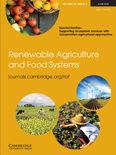
RENEWABLE AGRICULTURE AND FOOD SYSTEMS
Exploring the nexus of agriculture, sustainability, and innovation.RENEWABLE AGRICULTURE AND FOOD SYSTEMS, published by Cambridge University Press, is a leading open-access journal dedicated to the advancement of sustainability in agricultural practices and food systems. With an ISSN of 1742-1705 and an E-ISSN of 1742-1713, this journal spans the interdisciplinary fields of agronomy and food science, achieving a commendable Q2 ranking in both categories for 2023. As it continues to converge through the years from 2004 to 2024, the journal offers a platform for researchers, professionals, and students to disseminate transformative research that addresses the challenges of food security, resource management, and environmental impact. The journal’s significant impact is underscored by its Scopus rankings, situating it in the 77th percentile among agronomy and crop science publications, and the 67th percentile in food science. Since becoming fully open access in 2023, RENEWABLE AGRICULTURE AND FOOD SYSTEMS promotes wider accessibility to vital research findings, fostering collaboration and innovation in the pursuit of sustainable agricultural practices and food systems worldwide.

Cuadernos de Desarrollo Rural
Pioneering Discourse on Latin America's Rural ChallengesCuadernos de Desarrollo Rural, published by the PONTIFICIA UNIVERSIDAD JAVERIANA in Colombia, is an essential academic journal that serves as a pivotal platform for discourse in the fields of Agronomy, Economics, and Geography. With an ISSN of 0122-1450 and an E-ISSN of 2215-7727, this journal has been contributing to the body of knowledge since its inception in 2008. Although its impact factor and H-index are not available, its current Scopus ranking reflects a growing presence in the academic community, situated in the Q4 category for Agronomy and Crop Science and Economics and Econometrics, while achieving Q3 in Geography, Planning and Development. The journal is committed to advancing research and policy discussions that address rural development challenges in Latin America and beyond. Through rigorous peer-reviewed articles, it aims to foster an understanding of sustainable practices in agriculture and economic development, making it a valuable resource for researchers, professionals, and students dedicated to these critical issues.

JOURNAL OF AGRICULTURAL ECONOMICS
Empowering researchers with cutting-edge agricultural insights.JOURNAL OF AGRICULTURAL ECONOMICS, published by Wiley, is a leading scholarly journal dedicated to the field of agricultural economics. Since its inception in 1928, the journal has provided a platform for rigorous research, offering insights and analysis on the economic aspects of agriculture, food production, and rural development. With an impressive impact factor and ranked in the Q1 category in both Agricultural and Biological Sciences as well as Economics and Econometrics, it stands among the top-tier publications in its field. The journal's ISSN is 0021-857X, and it also has an E-ISSN of 1477-9552. Researchers, professionals, and students seeking to enhance their understanding of agricultural economic policies and practices will find invaluable resources, empirical studies, and theoretical discussions within its pages. The JOURNAL OF AGRICULTURAL ECONOMICS remains an essential conduit for advancing knowledge and shaping discussions that matter in the global agricultural economy.
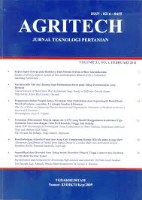
Agritech
Advancing Sustainable Solutions for Tomorrow's AgricultureAgritech is a prominent open-access journal dedicated to advancing the field of agricultural technology. Published by UNIV GADJAH MADA, FAC AGRICULTURAL TECHNOLOGY, this esteemed journal disseminates innovative research and cutting-edge practices that contribute significantly to sustainable agriculture, precision farming, and environmental stewardship. Launched in 1999, Agritech has established itself as a vital resource for researchers, professionals, and students alike, providing a platform for the exchange of ideas and findings that shape the future of agricultural technology. By embracing an open-access model, the journal ensures that high-quality research is accessible to a global audience, promoting collaboration and knowledge sharing in the agricultural community. With an ISSN of 0216-0455 and an E-ISSN of 2527-3825, Agritech remains committed to enriching agricultural practices and policies through rigorous scientific inquiry and innovation.
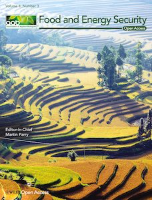
Food and Energy Security
Connecting Ideas to Foster Food and Energy SustainabilityFood and Energy Security, an esteemed journal published by WILEY, is dedicated to advancing the fields of food science, agriculture, and renewable energy. Since its inception in 2012, this open-access journal has provided a platform for groundbreaking research and innovative practices that address global challenges related to food production and energy sustainability. With an impressive impact factor reflected in its Q1 quartile rankings across notable categories such as Agronomy and Crop Science and Food Science, this journal is instrumental for researchers and practitioners alike who are focused on enhancing food security and promoting sustainable energy solutions. The journal's scope encompasses multidisciplinary approaches and encourages submissions that explore the intersection of food systems and energy dynamics, ensuring relevance in the evolving landscape of environmental science and policy. By offering open access to its publications, Food and Energy Security commits to making vital research accessible, fostering informed dialogue and collaboration among scholars, policymakers, and the agrifood industry worldwide.
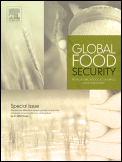
Global Food Security-Agriculture Policy Economics and Environment
Advancing global food security through innovative research.Global Food Security - Agriculture Policy Economics and Environment is a leading interdisciplinary journal published by Elsevier that addresses critical issues in food security through the lens of agriculture, economics, and environmental sustainability. With an impressive impact factor and a distinguished placement in the Q1 quartile across multiple categories including Ecology, Food Science, and Safety Research for 2023, this journal is a vital resource for researchers and practitioners aiming to address modern challenges in global food systems. Covering essential topics from agricultural policy to ecological implications, the journal provides a platform for innovative research and policy discussions that foster the advancement of food security on a global scale. Notably, it is indexed in Scopus, where it ranks in the top percentiles across its relevant categories, reflecting its significance in the field. The journal is accessible to a wide audience, making it an indispensable source of knowledge for professionals and students aiming to tackle the complex interplay between food production and environmental stewardship.
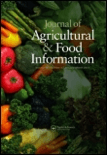
Journal of Agricultural & Food Information
Connecting Insights for a Food-Secure Future.Welcome to the Journal of Agricultural & Food Information, a pivotal platform for disseminating research and insights across the domains of agronomy, food science, and information systems management. Published by Routledge Journals, Taylor & Francis Ltd, this esteemed journal, with an ISSN of 1049-6505 and E-ISSN 1540-4722, plays a crucial role in bridging the gap between innovative agricultural practices and food information systems. Despite its current categorization in the Q4 quartile across relevant fields, it remains committed to fostering scholarly dialogue and encouraging interdisciplinary collaboration. With a history of publication spanning multiple converged years from 1993 to 2024, the journal is dedicated to publishing high-quality, peer-reviewed articles that address the challenges and advancements in agricultural and food information. Currently not available as Open Access, this journal provides valuable insights for researchers, professionals, and students who are eager to harness information for the progress of food security and sustainable agricultural practices. Join the conversation in enhancing our understanding and application of vital agricultural and food-related information.

Economia Agraria y Recursos Naturales
Exploring Sustainable Solutions for Agriculture and NatureEconomia Agraria y Recursos Naturales, published by UNIV POLITECNICA VALENCIA, EDITORIAL UPV, is a prominent open-access journal that has been serving the fields of agricultural and biological sciences, environmental science, and geography since 2001. With an ISSN of 1578-0732 and an E-ISSN of 2174-7350, this journal is dedicated to publishing high-quality research that contributes to the sustainable management of natural resources and agricultural practices. The journal invites scholars, practitioners, and students to explore and share innovative findings that address pressing environmental challenges. While currently categorized in the lower quartiles (Q4) for various disciplines in 2023, its open-access model ensures wide dissemination and visibility for authors and their work, aligning with the growing trend towards accessibility in academic publishing. Positioned in Spain, Economia Agraria y Recursos Naturales is a valuable resource for those seeking to engage with the intersection of agriculture, environmental studies, and policy planning within a global context.
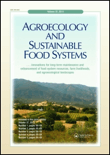
Agroecology and Sustainable Food Systems
Transforming agriculture with cutting-edge research.Agroecology and Sustainable Food Systems, published by Taylor & Francis Inc, is a premier academic journal dedicated to advancing the science of agroecology and its applications in sustainable food systems. With an impact factor that reflects its significant influence in the field, this journal serves as a vital resource for researchers, industry professionals, and students engaged in sustainability, agriculture, and environmental studies. As of 2023, it proudly holds a Q1 ranking in Agronomy and Crop Science, as well as Q2 rankings in Development and Renewable Energy, Sustainability, and the Environment categories. Covering a broad spectrum of topics, it not only shares peer-reviewed research but also encourages discourse on innovative practices and policies that enhance food security and ecological balance. Available for access through various options including Open Access, the journal's commitment to knowledge dissemination is further underscored by its substantial rankings on Scopus, with notable percentiles across multiple disciplines. By focusing on agroecological principles and their socio-economic implications, Agroecology and Sustainable Food Systems is essential for those looking to stimulate meaningful change in agricultural practices and sustainability initiatives worldwide.